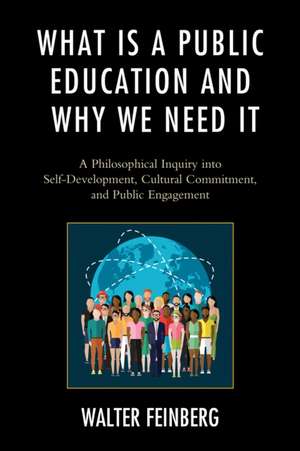What Is a Public Education and Why We Need It: Philosophy and Cultural Identity
Autor Walter Feinbergen Limba Engleză Hardback – 28 ian 2016
Preț: 629.53 lei
Preț vechi: 817.57 lei
-23% Nou
Puncte Express: 944
Preț estimativ în valută:
120.45€ • 125.78$ • 99.47£
120.45€ • 125.78$ • 99.47£
Carte tipărită la comandă
Livrare economică 15-29 aprilie
Preluare comenzi: 021 569.72.76
Specificații
ISBN-13: 9781498517225
ISBN-10: 1498517226
Pagini: 154
Dimensiuni: 157 x 231 x 20 mm
Greutate: 0.36 kg
Editura: Rowman & Littlefield
Seria Philosophy and Cultural Identity
ISBN-10: 1498517226
Pagini: 154
Dimensiuni: 157 x 231 x 20 mm
Greutate: 0.36 kg
Editura: Rowman & Littlefield
Seria Philosophy and Cultural Identity
Notă biografică
Walter Feinberg is Charles D. Hardie Professor, Emeritus of philosophy of education at University of Illinois Urbana-Champaign.
Descriere
This book brings the idea of a public-defined in part as the quality of communication among strangers-back into focus. The benefits of doing this are many, but perhaps the most important are to adjust our understanding of what is good teaching and to widen our understanding of what counts as central to the educational process.







